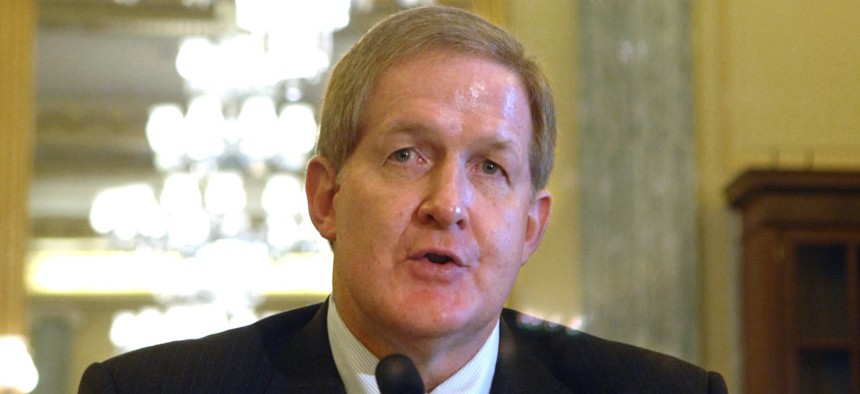
Tom Williams/Getty Images
Kip Hawley Was An Uncommon Leader For All-Too-Common Times
The former Transportation Security Administration chief rose to the occasion -- twice -- and his is a model we need to emulate, Justin P. Oberman writes in this remembrance.
In the wake of 9/11, Tom Ridge left the Pennsylvania governor’s mansion to oversee our domestic response from the White House. A few days later, and 10 blocks away at the Department of Transportation, Edmund “Kip” Hawley, who left his work and family in California, showed up to resuscitate airline travel.
Kip’s recent passing in March at 68 puts in stark relief that while people of his caliber and character are needed now more than ever, they seem to be in short supply as we face once-in-a-lifetime cataclysmic events year over year.
I was privileged to join Kip and Ben Smith – whom Kip recruited – when the three of us were sent to a tiny conference room at the DOT to start a new agency: the Transportation Security Administration.
We built the agency with an almost comically diverse team. We had senior officials from every law enforcement and military agency, executives from Intel, Disney, and FedEx, more than a thousand transfers from the Federal Aviation Administration, and dozens of whippersnappers (including me).
TSA rose in a whirl of activity that is as hard to believe as it is to explain. We recruited, hired, trained, and deployed 65,000 new employees. We sourced and installed more than $2 billion worth of equipment. We complied with 37 separate congressional mandates, never missing a deadline. We set up shop in 450 locations from the far reaches of the Pacific (Tinian Island) to the sun splashed U.S. Virgin Islands, and at all points in between. And we we did it all in 13 months.
Kip was the ideal, and maybe only, leader who could pull this off. For one thing, he never looked like he was making it up as he went, even though he was! Every day!
For another, we made too many mistakes to count. Luckily, we had Kip’s tutelage to guide us: Admit error. Show how you will prevent missteps next time. Be of good cheer. And when an issue is really important, write it up on green paper (the last a trick he adapted from his first stint in government).
My first meeting with him, just a few minutes long and perhaps the most important of my career, was in November 2001. Despite my backing from then-Transportation Secretary Norm Mineta, Kip insisted that I establish my bona fides. Luckily, I aced the meeting based on my answer to his first question: “What are your goals?” I answered truthfully: “Serve for a while before returning to the private sector.” The second half of that sentence, not what Kip expected, elicited a slight, but unmistakable, smile. He was genuinely surprised, certainly pleased, and somewhat bemused that he might have misjudged me.
Weeks later, I was assigned the dual tasks of submitting to Congress a plan for training our new hires, and writing taskings for a vendor to carry out the work. Boom! Kip cut my workload by 50% and improved the product immeasurably when he said that these documents should be one and the same. Kip set an example for transparency that should be the standard.
Years later, when I was in the middle of a terrible PR problem for TSA, Kip (who had not yet been confirmed to be the formal head of TSA for his third role in government), attended a meeting where I was grilled for nearly two hours by then-Secretary Michael Chertoff. It was necessary, but unpleasant. He called after to give me a much-needed pep talk.
A few months on, when I broke protocol as a testifying witness, Kip called to pass along his staff’s complaints. When I retorted that I gave the only viable answer to the question asked, he said “this man must be stopped!” chuckled and hung up. It was exactly what I needed to hear.
Perhaps my most indelible memory is of a dour reunion on Aug. 28, 2005. Kip, who had come back to be head of TSA, former Deputy Secretary of Transportation Michael Jackson who now had that role at Homeland Security, and I all met that morning.
After we finished reviewing a program of mine, I asked Michael about the rest of his day. He said, with resignation and sorrow, “I’m headed to FEMA, New Orleans is going to be decimated.” (Hurricane Katrina would cause the levees to breach the following afternoon.) That cast a pall and as I glanced at Kip I got another knowing, slight smile whose message was clear: there can be no letup regardless of the challenge. It was the same look, and the same message, years apart, that I was so fortunate to see that first day.
Would that our country and world not need people of Kip’s unique blend of intelligence, compassion, and leadership. We do need it, and his untimely passing leaves a terrible void.
Justin P. Oberman, based in Chicago, is the founder of Assemble, a merchant bank for innovation, and CEO of a stealth aviation startup. He served at TSA from November 2001 to December 2005.






